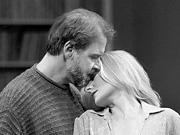DESPITE A LOT of ink spilled trying to connect intellect and emotion, something is fundamentally irreconcilable between the two. (Anyone who’s had their “I love you” answered by a “What do you mean?” will know what I’m getting at.) The best that most of us manage to accomplish in terms of “analyzing our feelings” is a postmortem of what we once felt, an attempt to sort out when and where our emotions ebb and flow.
The Real Thing
Intiman Theater through June 3
So it’s the considerable challenge of Tom Stoppard’s 1982 play The Real Thing to use the tools of the intellect to examine a love affair while it’s happening. Stoppard, whose recent popular successes with Arcadia and as the screenwriter for Shakespeare in Love have softened his reputation as a fine intellect but a cold fish, wrote a number of fail-safes into this earlier piece to keep the semiautobiographical material at a distance.
Already a dab hand at the “play-within-a-play” concept, Stoppard here includes several plays within his play, one of which, the domestic drama House of Cards, actually begins the evening. With characteristic irony, it’s soon revealed that while Cards’ fictional wife is suspected of cheating on her husband, the play’s writer, Stoppard’s fictional proxy Henry (James McDonnell), is actually involved in an affair with Annie (Laurie Williams), the wife of the actor who portrays the husband in the play.
THE FIRST HALF of David Fish’s production is a bit of a mess, and that’s a charitable estimation. Part of the problem results from some serious miscasting. Terry Alexander, as Annie’s actor-husband Max, occasionally stumbles with the language and seems far too assertive for the role of a likable but timid schlemiel, while Gail Grate, as Henry’s wife Charlotte, is comfortable with Stoppard’s often elongated syntax but merely brittle where she should be bitchy. The writing also contributes to the difficulty: The play’s first half, filled with Stoppard’s donnish references to pop music, has dated badly. (His musical enthusiasms, from the Righteous Brothers to the Turtles, are enough to annoy even the creakiest boomer.) The material also carries a certain whiff of autobiographical self-justification. Neither Annie nor Henry, in their callous decision to abandon each of their spouses, proves a very likable character—and the pain they cause remains almost entirely offstage.
In the second half of the play their actions reverberate with a vengeance, as they watch their own relationship become immersed in betrayal and jealousy. Here the playwright does his best work, with a careful examination of feeling as incisive as the poetry of Houseman or e.e. cummings, yet almost clinical in its precise prose. McDonnell’s bravura performance as Henry shows us a man who saves all of his complex imagination for his writing and thus naively believes loving is simply a matter of trust and intensity. When Annie eventually falls for a charming younger actor (Jacob Fishel), Henry is entirely unprepared for the suspicion and pain that assaults him. While Williams never quite manages to match McDonnell’s efforts, it’s an uneven contest; she has less of a character to work with. (Stoppard’s sly attempt at sidestepping this failing with a dialogue about how Henry habitually shortchanges his female characters of depth doesn’t really wash.)
The play’s ending has a bit of a self-satisfied smirk, and Stoppard’s suspect politics (and covert male chauvinism, with Annie inevitably cleaving unto her strong husband’s shoulder) are an inadequate salve to the emotional issues he’s raised. Despite the shaky first half, director Fish has done justice to some of Stoppard’s sharpest writing and manages to produce an evening that adroitly mixes dry wit with the unmistakable ache we feel when our own romances return to reality.








